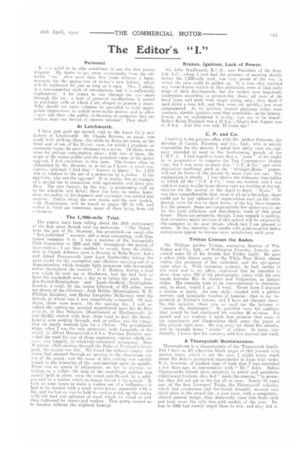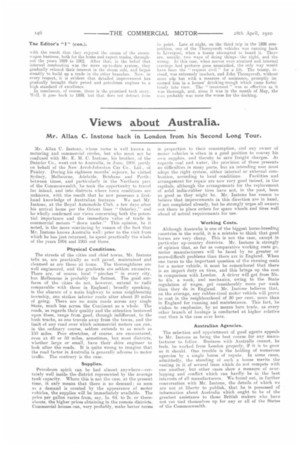The Editor' s
Page 3

Page 4

If you've noticed an error in this article please click here to report it so we can fix it.
" I" .
Personal, It is a relief to be able sometimes to use the first person singular My desire to get away occasionally from the editorial " we," after more than five years without a lapse, accounts for the appear-slice of to-day's new feature, which will be continued for just so long as it runs. This, I admit, is a non-committal style of introduction, but it is sufficiently explanatory. A lot comes to one through the eye—more through the ear: a host of personal recollections is stored in particular cells of which I am alleged to possess a share. Why should not extra columns he provided to hold appropriate impressions. to unfold permissible stories, and to allow —now and them—the public re-dressing of memories that are neither dead nor devoid of current interest? They shall.
At Letchworth,
I have just. paid my second visit to the Lacre Co.'s new factory at Letchworth. Mr. Claude Browne, as usual, was ready with striking ideas : the while he drove me about on the front seat of one of his 10-cwt. vanS, for which 1 prophesy an enormous vogue, he gave utterance to a series. Of these, some were for private consumption alone; with two of them, the scope of the motor pedlar and the practical value of the motor egg-van, I deal elsewhere in this issue. The former plan, as elaborated by Mr. Browne, is. so far as I know, a novel conceptien, although I find that. " Answer to Query " No. 1,375 was in relation to the use of a motorvan by a pedlar. If the egg-train, why not the egg-van? It is, surely, but an example of a special use in connection with agriculture and dairy produce. The new factory, by the way, is progressing well up to the schedule laid down; there has been no undue haste, since the policy of development and extension was settled last summer. Points about the new works and the new models, with illustrations, will be found on pages 1.47 to 149, arid eiders in hand are numerous, many of them being from old emstemers.
The 1,000-mile Trial.
The papers have been telling about the 10th anniversary of the first great British trial for motorcars. " The Motor," from the pen of Mr. Sturmey, has presented—as usual—the " first-published " account, and a most-interesting, well-illustrated summary it is. I was a member of the Automobile Club Committee in 1899 and 1900, throughout the period of organization; I am thus enabled to record, from the
that to Claude Johnson (now a director of Rolls; Royce, Ltd.) and Alfred Harnisworth (now Lord Northcliffe) belong the joint credit for the conception and effective carrying-oat of a demonstration which brought light motorcars into favourable notice throughout the country. df. E. Hutton, during a trial run which he took me to Maidstone, had the bad luck to have. the crankshaft seize, a day or so before the start. London-Bristol-Birmingham and Leeds-Sheffield Nottingham. London, a total, by the routes followed, of 475 miles, were my shares of the itinerary : Jack Holder (Birmingham), R. E. Phillips (London), and Herky Langrishe (Kilkenny) were the drivers to whose care I was respectively entrusted. Of incidents, there were scores. On the opening day. I well recollect the coming-up, perched unprotected upon his de Dion tricycle, of Dan Simpson (Manchester) at Marlborough : he was thickly coated with dust, from head to heel, his heady. looking eyes peeping through. and. so yellow was his visage, that we nearly mistook him for a Chines. The penultimate stage, when I was the only passenger, with Lanstrishe at the wheel. in Alfred Harmsworth's 6 h.te. Parisian Daimler, provided the need for one of those emergency repairs which are rants very happily, of relatively-infrequent occurrence. Near Worksop. while passing through the Duke of Portland's lovely park. the engine ran hot. We found the radiater empty: the water had escaped through an opening in the aliamiuium CPSing of the pump, and the cause of this cutting was quickly traced to the loosening of the vane-member upon its spindle. There was no means of adjustment. no key or keyway, no bolting to a collar the boss of the centrifugal portion was merely held in place, noon the coned spindle-end. by a splitpin and Ire a washer which no longer forced it far enough. It. took us some hours to make a washer out of a halfpenny—it had to he started with a small screwdriver, reamered with a file, and we had no vice to hold it—and to patch up the casing with red lead and splinters of wood which we wired on and thee' tightened by improvised wedges. That pump carried us to London without the slightest leakage. Brakes, Ignition, Lack of Power.
Sir John MacDonald, K.C.B., now President of the Scottish A.C., whom 1 first had the pleasure of meeting shortly befm.e the 1,000-mile trial, was very proud of the way in which the ears could be pulled up. It is true they excelled any horse-drawn vehicle in this particular, even at that early stage of their development, hut the brakes were hopelessly inadequate according to present-day ideas: all were of the band typo, and most were single acting only ; they fired if used down a long hill, and they wore out quickly ; few were compensated. As to ignition, heated platinum tubes were common, electric ignition—and that unreliable—in its infancy. Power, as we understand it to-day, was not to be found: Rolls's flying Panhard was a 12 h.p.; Edge's first Napier was an 8 h.p. And this was only JO years ago!
C. P. and Co.
Chatting in his private office with Mr. Arthur Paterson, the director of Carter, Paterson and Cos Ltd., who is mainly responsible for the motors, I asked how many vans his company imended to 'send to the forthcoming parade of the C.:\I.U.A. I had hoped to leant that a team of six might be in preparation to compete for Ins COMMERCIAL Mann Cop, but I was sorry to learn that. " C.P. k Co." and other distinctive markings, cinch as the " Straight-Home " poster, will not be borne at the parade by more Clan one van. The explanation is simple. I was shown the elaborate time-tables to which all the " C.P. & Co." vans are worked, and 1 was told how many smaller horse-drawn vans are waiting at the outstatioes for the arrival of the depiiteto-depot " flyers." It was then comprehensible that, most of all on a Saturday, there could not be any upheaval of organization :Seth RS the withdrawal, even for two or three hours, of the big three-tonners. For the present, there are comparatively-few motorvans in use for the local collection and distribution work of this great house. There are prospects, though. I may remark in passing, that extensive motor services of this nature will be adopted by the company in the near future, which fact I am pleased to relate. So far, however, the results with point-to-point motor conveyance appear to become more satisfactory each year.
Tritton Crosses the Andes.
Mr. William Ashbee Tritton, managing director of Wm. Foster and Co., Ltd., of Wellington Foundry, Lincoln, astonished some 15 of his friends last Friday night. He gave a select little dinner party at the White Hart Hotel, almoet within the precincts of the cathedral, and the eye-opener came after it. With becoming modesty, he had, earlier in the week and in my office, explained that he intended to show close upon 100 of his photographs, taken with his own hands between Rio de Janeiro and Valparaiso, as lantern slides. His remarks were to be conversational in character, and, in short, would I go? I went. Never have I enjoyed a lecture so much. An easy style, coupled witha perfect memory and inimitable touches of humour : that is my impression of Tritton's lecture, and I have sat through many. On this occasion, there was no need for the lecturer to " square the doorkeeper." Si) gratified were his auditors, they would he had continued for another 90 minutes, For myself and my readers. I made him promise that some of his experiences and illustrations shall grace the pages of this journal right soon. He was away for about five months, and he brought home " stacks " of orders. At home, incidentally, I know that his company sold five tractors last week.
A Thornycroft Reminiscence.
Thoroughness is a characteristic of the Thornycroft family. Did I have to fill otherwise blank pages of this journal with marine notes, which is not the case, I might relate much about Sir John's protracted experiments in huge. trial tanks. It is, however, of another class of tank that I was reminded a few days ago, in conversation with " Mr." John. Before Ihornycrofts turned their attention to petrol and petroleum vehicles and tractors, they had " made the running " in steam ; hut they did not get to the top all at once. Nearly 12 years ago, at the first. Liverpool Trials, the Thornycroft vehicles, which had condensers and fan-forced draught, secured only third place in the award list ; a year later, with a completelyaltered general design, they deservedly came into front rank and took away the only two gold medals of the year. Defeat in 1908 had merely urged them to win, and they did it.
The Editor's "I" (con,),
with the result. that they enjoyed the cream of the steamwagon business, both for the home and export trades, throughout the years 1899 to 1902. After that., in the belief that internal combustion was the more up-to-date system, they gradually relaxed their interest in the steam side, and began steadily to build up a trade in the other branches. Now. in every respect, it is evident that detailed improvement has gradually brought their petrol and petroleum engines to a high standard of excellence.
In conclusion, of course, there is the promised tank story. Well, it goes back to 1898, but that does not detract from point. Late at night, on the third trip in the 1898 competition, one of the Thornycroft vehicles was running back to Liverpool, when a tramp attempted to board it. There. are, usually, two ways of doing things—the right, and the wrong. In this case, when nerves were strained and internal cravings had perforce gone unsatisfied, the only way would have been the " request civil " for a lift. The tramp, instead, was extremely insolent, and John Thornycroft, without more ado but with a measure of assistance, promptly im• inersed him in a horses' drinking-trough which came fortui tously into view. The " treatment " was as effective as it wes thorough, and, since it was in the month of May, the mail probably was none the worse for the ducking.






















